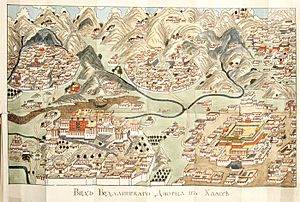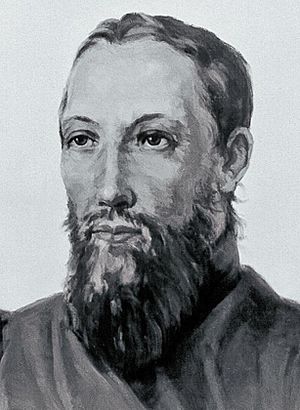Hyacinth (Bichurin) facts for kids
Nikita Yakovlevich Bichurin (Никита Яковлевич Бичурин) was a very important Russian scholar. He lived from 1777 to 1853. He is best known by his monk name, Iakinf (sometimes spelled Hyacinth). He is considered one of the people who helped start the study of China in Russia, known as Sinology. He translated many Chinese books into Russian. These translations were then used to translate works into other European languages.
Contents
Who Was Iakinf Bichurin?

Iakinf Bichurin was born in a village called Akulevo. His father was a Russian-Chuvash priest, and his mother was Russian. From a young age, he showed a talent for learning.
Early Life and Studies
Bichurin first studied at a church choir school. Later, he went to the Kazan Theological Seminary. He was very good at languages. He learned Latin, Greek, and French. An important church leader, Archbishop Amvrosij Podobedov, noticed his skills.
In 1799, he started teaching at the Kazan Theological Seminary. The next year, in 1800, he became a monk. He was given the name Iakinf.
His Time in China
After becoming a monk, Iakinf was sent to Beijing, China. His job was to help spread Christianity there. He stayed in China for 14 years. During this time, his main interest became Chinese history and language. He spent a lot of time learning about China.
When he returned, he faced some challenges with church leaders. He was removed from his monk rank in 1823. He was sent to live in the Valaam Monastery.
Important Work and Recognition
Even while at the monastery, Iakinf continued his studies. He translated many old Chinese writings. These writings had never been known in Europe before. Over the next few years, he published many books. These books were about Chinese and Mongolian history, geography, religion, and farming.
After a new ruler, Tsar Nikolai I, came to power in 1825, Iakinf's friends helped him. He received a special pardon from the Tsar. He then moved to St. Petersburg. There, he worked as an interpreter for the Foreign Ministry.
In 1828, he became a member of the Academy of Sciences. He also worked as a librarian. He published a book called "Description of Tibet in the Modern Age." He continued to have disagreements with church authorities. However, Tsar Nikolai I stepped in and ordered him to continue his work.
Iakinf Bichurin was also the person who suggested the name East Turkestan in 1829. This name replaced the older term "Chinese Turkestan." In 1835, he received the Demidov Prize for his great work.
Opening a Chinese School
In 1837, Iakinf Bichurin opened the first Chinese-language school in the Russian Empire. This school was in a town called Kyaktha. The school helped improve trade between Russia and China. One of his students became a successful tea trader.
For all his contributions to understanding China, Iakinf Bichurin was recognized by important science groups. He was elected to the Russian, German, and French Academies of Sciences.
See also
 In Spanish: Nikita Bichurin para niños
In Spanish: Nikita Bichurin para niños
 | DeHart Hubbard |
 | Wilma Rudolph |
 | Jesse Owens |
 | Jackie Joyner-Kersee |
 | Major Taylor |


